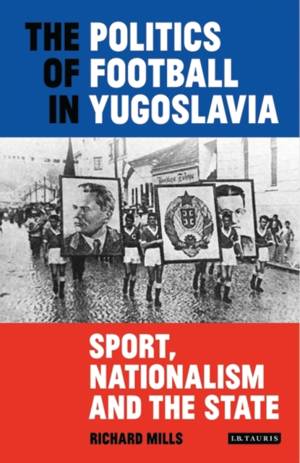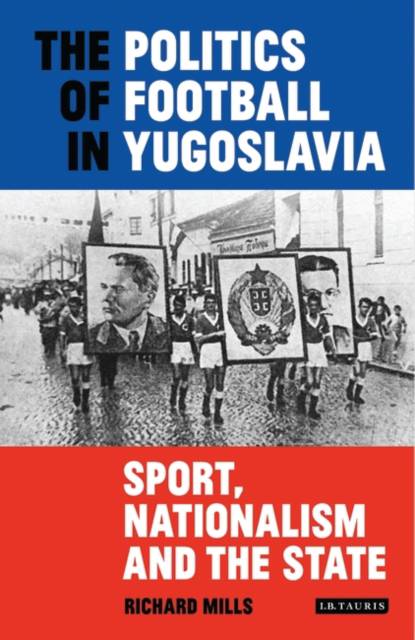
Je cadeautjes zeker op tijd in huis hebben voor de feestdagen? Kom langs in onze winkels en vind het perfecte geschenk!
- Afhalen na 1 uur in een winkel met voorraad
- Gratis thuislevering in België vanaf € 30
- Ruim aanbod met 7 miljoen producten
Je cadeautjes zeker op tijd in huis hebben voor de feestdagen? Kom langs in onze winkels en vind het perfecte geschenk!
- Afhalen na 1 uur in een winkel met voorraad
- Gratis thuislevering in België vanaf € 30
- Ruim aanbod met 7 miljoen producten
Zoeken
The Politics of Football in Yugoslavia Sport, Nationalism and the State
Sport, Nationalism and the State
Richard Mills
€ 271,45
+ 542 punten
Omschrijving
Winner of the Lord Aberdare Literary Prize for 2018
Even before Tito's Communist Party established control over the war-ravaged territories which became socialist Yugoslavia, his partisan forces were using football as a revolutionary tool. In 1944 a team representing the incipient state was dispatched to play matches around the liberated Mediterranean. This consummated a deep relationship between football and communism that endured until this complex multi-ethnic polity tore itself apart in the 1990s. Starting with an exploration of the game in the short-lived interwar Kingdom, this book traces that liaison for the first time. Based on extensive archival research and interviews, it ventures across the former Yugoslavia to illustrate the myriad ways football was harnessed by an array of political forces. Communists purposefully re-engineered Yugoslavia's most popular sport in the tumult of the 1940s, using it to integrate diverse territories and populations. Subsequently, the game advanced Tito's distinct brand of communism, with its Cold War-era policy of non-alignment and experimentation with self-management. Yet, even under tight control, football was racked by corruption, match-fixing and violence. Alternative political and national visions were expressed in the stadiums of both Yugoslavias, and clubs, players and supporters ultimately became perpetrators and victims in the countries' violent demise.
In Richard Mills' hands, the former Yugoslavia's stadiums become vehicles to explore the relationship between sport and the state, society, nationalism, state-building, inter-ethnic tensions and war. The book is the first in-depth study of the Yugoslav game and offers a revealing new way to approach the complex history of Yugoslavia.
Even before Tito's Communist Party established control over the war-ravaged territories which became socialist Yugoslavia, his partisan forces were using football as a revolutionary tool. In 1944 a team representing the incipient state was dispatched to play matches around the liberated Mediterranean. This consummated a deep relationship between football and communism that endured until this complex multi-ethnic polity tore itself apart in the 1990s. Starting with an exploration of the game in the short-lived interwar Kingdom, this book traces that liaison for the first time. Based on extensive archival research and interviews, it ventures across the former Yugoslavia to illustrate the myriad ways football was harnessed by an array of political forces. Communists purposefully re-engineered Yugoslavia's most popular sport in the tumult of the 1940s, using it to integrate diverse territories and populations. Subsequently, the game advanced Tito's distinct brand of communism, with its Cold War-era policy of non-alignment and experimentation with self-management. Yet, even under tight control, football was racked by corruption, match-fixing and violence. Alternative political and national visions were expressed in the stadiums of both Yugoslavias, and clubs, players and supporters ultimately became perpetrators and victims in the countries' violent demise.
In Richard Mills' hands, the former Yugoslavia's stadiums become vehicles to explore the relationship between sport and the state, society, nationalism, state-building, inter-ethnic tensions and war. The book is the first in-depth study of the Yugoslav game and offers a revealing new way to approach the complex history of Yugoslavia.
Specificaties
Betrokkenen
- Auteur(s):
- Uitgeverij:
Inhoud
- Aantal bladzijden:
- 416
- Taal:
- Engels
- Reeks:
Eigenschappen
- Productcode (EAN):
- 9781784539139
- Verschijningsdatum:
- 1/09/2018
- Uitvoering:
- Hardcover
- Formaat:
- Genaaid
- Afmetingen:
- 145 mm x 213 mm
- Gewicht:
- 635 g

Alleen bij Standaard Boekhandel
+ 542 punten op je klantenkaart van Standaard Boekhandel
Beoordelingen
We publiceren alleen reviews die voldoen aan de voorwaarden voor reviews. Bekijk onze voorwaarden voor reviews.









